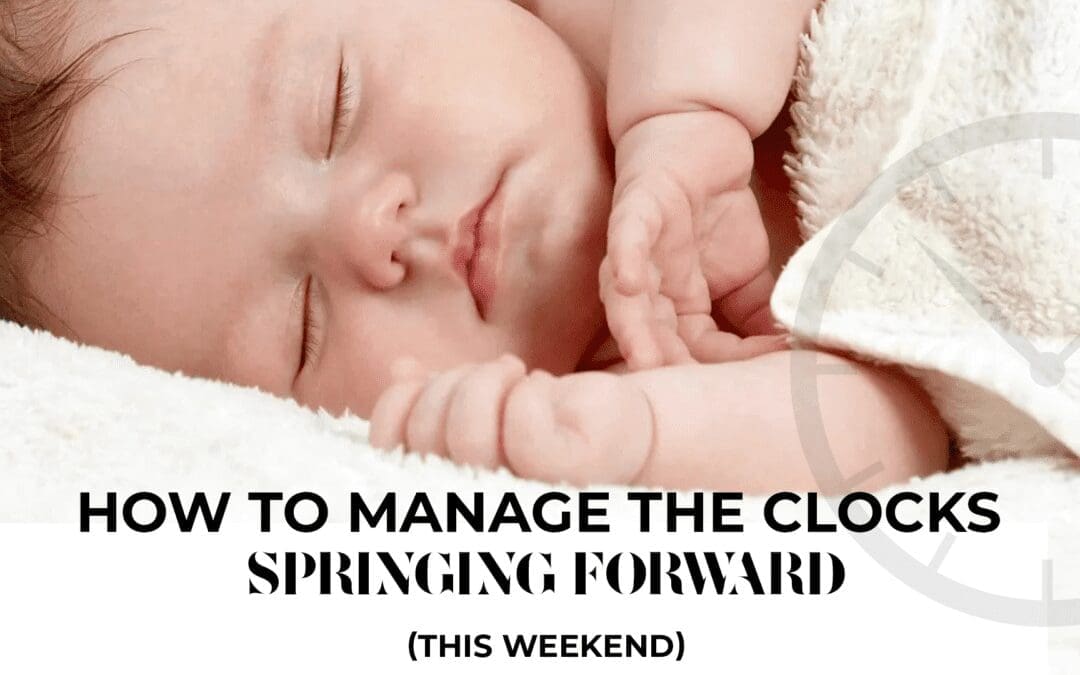HOW TO MANAGE THE CLOCKS SPRINGING FORWARD THIS WEEKEND
Twice a year when the clocks change, we are inundated with questions and parents asking what they can do. Although the spring clock change can play havoc with our bodies (an increase in heart attacks and strokes the day after this happen) but it can really help you if you have a little one who likes waking before 5am!
If you happen to have an early riser just don’t take any action and stick to their current body clock – this means that the clocks change but their body clock wont and 5am magically became 6am!
If, however, your routine works for you we have a guide for how to mange the upcoming clock change, depending upon the age of your little one!
For all little ones (and us adults):
Bear in mind that the clock change also brings lighter evenings. This may nt be as much of an issue for us as adults but your little one may be going to bed when it is very light outside. With this in mind, we recommend you make your child’s bedroom as dark as possible to limit any sunlight coming into their room which could make it difficult for them to fall/stay asleep. Ideally a 10/10 for darkness until they become a toddler and may need a little night light if they are scared of the dark.
Using something like a blackout blind or even blackout card/material over the window can be really helpful to block any residual light.
Daylight is the best regulator of our circadian rhythms (body clock) so ensure your little one, and you, get outside to use the daylight to help your body clock adjust.
Overall, it can take about a week for children and babies to completely adjust to a new time, some children can take up to a month. Be patient and remain consistent and it will happen!
Older children:
For children who are no longer napping we would advise you ‘split the difference’ between the old time and the new time. You don’t have to do anything until Sunday morning (and pretend you have a lie in) so start on Sunday night (first night of the change). Put your child to bed 30 minutes ‘later’ than they would usually go to bed – as an example, if their usual bedtime was 7pm you would put them to bed at 7.30pm (new ‘springtime’) instead. Do this for 3 nights and then on the 4th night put them to bed at the normal time – 7pm.
It may take a week or so to adjust (our body clocks can take it’s own sweet time) but persevere and try not to get involved too much after you have put your little one to bed It may take a little longer for them to fall asleep but, if they are happy, just leave them to it and they will naturally adjust.
Toddlers (over 1 and older):
These little ones will still be taking naps but, again, you don’t need to do anything until Sunday nap time. If they have two naps, put them down for their first nap 30 minutes later than normal. For example, if they usually nap at 9.30am you would put them down at 10am instead and do the same for the afternoon nap.
At bedtime if you usually put them down at 7pm, move this by 30mins and put them down at 7.30pm. Do this for 3 nights after the time change and then on the 4th night put them to bed at the normal time of 7pm. You can then move nap times back to normal on day 5. Again, it may take a week or so to adjust but try not to get involved too much after you have put your little one into their cot. It may take a little longer for them to fall asleep but, if they are happy, just leave them to it and they will naturally adjust.

Infants (between 4-12 months):
For little ones of this age, we can change their internal body clock a little more gradually. They will be having between 2-4 naps per day so we will move nap time by 15 minutes each day until they are on their ‘usual’ nap time by Thursday.
You would also do the same for bedtime, if their bedtime is normally 7pm then move bedtime 15 minutes earlier each night until you reach their normal time. So, on Sunday night you would put them down at 7.45pm (‘new springtime’), next night at 7.30pm and so on. By the fourth night you should be back to their ‘normal’ time of 7pm.
Newborns:
These little ones have not developed sleep cycles or melatonin so you will find their sleep is much less predictable. If you have a newborn you can simply just jump to the new time on Sunday night as if you were traveling to a new time zone. It may take your little one a little longer to fall asleep which is expected as they might not be as tired to start with but just allow them to fall asleep independently, as much as you can.
If you are having any trouble with any aspect of your child’s sleep please do get in touch with Little Dreams Consulting – we would love to help you all get a better night’s sleep.
About Little Dreams Consulting:
Established by Jenna Wilson, a former solicitor, in 2016, Little Dreams Consulting is an award-winning baby and child sleep consultancy based in Bristol. It works with tired parents around the UK to help everybody get a better night’s sleep.
Having proved the business is profitable and sustainable, Little Dreams launched their British Franchise Association accredited and award winning franchise in December 2021 and now has 4 franchisees working around the UK. If a new career you can be proud of, whilst changing the lives of sleep deprived families, is something you have been looking for get in touch with Jenna or download a prospectus here: (Franchise Your Own Sleep Consultant Business for Children (littledreamsconsulting.com)



